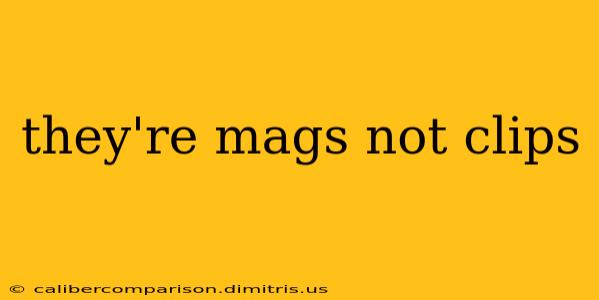They're Mags, Not Clips: Understanding the Nuances of Magnetic Fasteners
The world of fasteners is vast, encompassing everything from tiny screws to robust bolts. But one type often gets overlooked or mislabeled: magnetic fasteners. Frequently mistaken for simple clips, magnetic fasteners offer a unique set of advantages that make them ideal for a surprisingly wide range of applications. This article delves into the specifics of magnetic fasteners, highlighting their differences from clips and showcasing their versatility.
Why "Mags," Not "Clips"? A Crucial Distinction
The term "magnetic fasteners," or simply "mags," accurately reflects the core functionality: magnetism provides the fastening mechanism. Unlike clips, which rely on mechanical interlocking or pressure, magnets provide a clean, silent, and often more robust closure. This distinction is vital because it affects design considerations, material choices, and the overall performance of the product.
Clips typically use physical pressure or interlocking designs to hold items together. This can lead to:
- Wear and tear: Repeated use can cause clips to loosen or break, requiring replacements.
- Noise: Clips can often produce a clicking or snapping sound during operation.
- Limited holding power: Clip strength is usually dependent on the design and material, sometimes proving insufficient for heavier items.
Magnetic fasteners, however, offer several key advantages:
- Durability: Magnets inherently resist wear and tear, offering long-lasting performance.
- Silent operation: The attraction of magnets creates a nearly silent closure.
- Adjustable holding power: The strength of the magnetic field can be tailored to the application, accommodating various weights and pressures.
- Ease of use: Magnetic fasteners are incredibly user-friendly, often requiring minimal effort to open and close.
Exploring the Versatility of Magnetic Fasteners
The applications for magnetic fasteners are far-reaching, extending beyond simple closures:
- Electronics: In smartphones, laptops, and tablets, magnets are crucial for securing components and providing a secure closure mechanism.
- Automotive: Magnets are used extensively in automotive interiors for securing trim pieces and other components.
- Medical devices: Their silent and reliable nature makes them suitable for use in medical equipment where quiet operation is critical.
- Industrial applications: Strong magnetic fasteners are used in industrial settings for secure mounting and holding operations.
- Consumer goods: From wallets and handbags to jewelry and toys, the discreet and secure hold of magnetic fasteners adds value.
Choosing the Right Magnetic Fastener: Factors to Consider
Selecting the appropriate magnetic fastener depends on several factors:
- Holding strength: The required holding force determines the size and strength of the magnet.
- Material compatibility: The magnet material should be compatible with the materials being fastened.
- Operating environment: Factors like temperature and humidity can influence magnet performance.
- Aesthetics: The size and shape of the magnets must be considered to ensure proper aesthetics and integration with the overall design.
Conclusion: The Unsung Heroes of Fastening
While often overlooked, magnetic fasteners represent a sophisticated and reliable fastening solution. Their durability, silent operation, and versatility make them ideal for a vast array of applications. Understanding the distinct advantages of "mags" over clips is crucial for designers and engineers seeking robust and efficient fastening solutions. By carefully considering the factors outlined above, you can ensure that you select the optimal magnetic fastener for your specific needs. No longer should these essential components be mislabeled—they are indeed mags, not clips, and they deserve recognition for their contribution to countless products and industries.

